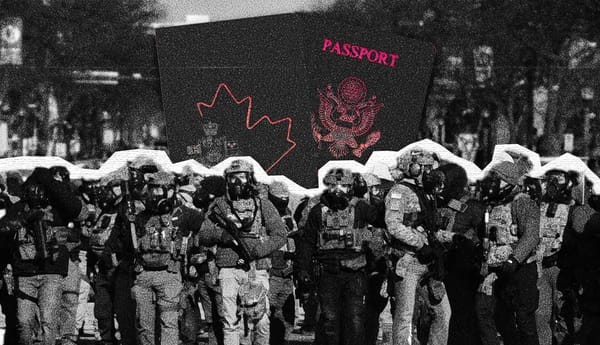This is the first story in a two-part investigation.
Includes update.
A federal government agency that assists Canadian arms exporters prepared a report last year documenting 99 cases of alleged Israeli crimes, but later considered any risks associated with a shipment of artillery components that included goods destined for Israel to be “appropriately mitigated.”
The Canadian Commercial Corporation (CCC), a Crown corporation that helps Canadian manufacturers secure military contracts with foreign states, did not disclose how it came to that conclusion, which has left arms control advocates baffled and shocked.
Kelsey Gallagher, a researcher with Project Ploughshares who first drew attention to the shipment, told The Maple: “Given the level of the humanitarian crisis in Gaza, it is hard to really conjure a mitigation measure that could reduce the level of risk of arms transfers to Israel below the threshold of substantial.”
The U.S. Department of Defence named the CCC last September as the signatory of the deal to supply Israel with up to $78.8 million of artillery propellants.
CCC signed the deal on behalf of General Dynamics Ordnance and Tactical Systems - Canada in Valleyfield, Quebec (GD-OTS), the sole source supplier of the product.
The deal was a modification of an existing $1.79 billion contract dating back to 2019 for the general supply of artillery propellants to the U.S. military. The main contract is one of the largest ever between a Canadian supplier and the United States.
The propellants in question are used to fire 155mm artillery shells, a caliber of munition that Israel has used heavily in its attacks on Gaza
The deal flew in the face of the Liberal government’s claimed policy of halting all arms exports to Israel. After Project Ploughshares drew attention to the deal in March, Global Affairs Canada (GAC) told The Maple that it remained “in communication with the parties involved to ensure compliance with Canada’s rigorous export controls regime.”
GAC did not say if it was intervening to terminate the deal, and did not respond to a request for comment for this story. Liberal Party politicians, including Prime Minister Mark Carney, similarly avoided questions about it during the recent federal election campaign.

New documents obtained by The Maple through an access to information request reveal that months before Project Ploughshares brought details about the deal to light, CCC was closely examining Israel’s human rights abuses, including those allegedly committed with 155mm artillery shells, and noting reports about the United States diverting shipments of that type of munition from their originally intended destinations to Israel.
Despite this, CCC considered the human rights risks associated with the artillery propellants deal to be “appropriately mitigated.” How exactly it reached that conclusion, however, remains unclear.
99 Alleged Crimes Identified
In December 2024, CCC’s human rights committee prepared a report concerning “indirect transfers” of Canadian-made military goods to foreign states. The term “indirect transfers” refers to goods that are shipped to one country (typically the U.S.) before being forwarded on to another destination.
While the vast majority of the report obtained by The Maple was redacted by CCC, almost all of the document’s footnotes remain visible. The committee cited dozens of reports, investigations and news stories that referred to specific incidents and allegations of Israeli abuses, including with American-supplied weapons.
The citations included reports by leading human rights organizations concluding that Israel is committing a genocide against Palestinians in Gaza, and other sources documenting: Israel’s consistent escalations of military activity in civilian areas; its killing of women, children and babies, as well as medics, aid workers, journalists and teachers; its forced displacement of civilians and its destruction of entire neighbourhoods in Gaza; sexual abuse and torture by Israeli soldiers against Palestinian detainees; summary executions and discoveries of mass graves in Gaza; Israel’s general disregard for international law; and the ongoing impact of the Nakba, the Arabic word used to refer to the ethnic cleansing campaign against Palestinians that made way for the state of Israel in 1948.
Notably, the report also cited cases indicating that Israel was specifically using weapons supplied by foreign states — particularly the United States — to commit abuses.
For example, one footnote referenced a Human Rights Watch report from March 2024 which said Israel’s assurances it was using American weapons legally were “not credible.” Another referred to an article published by The Guardian, which noted the U.S. had identified nearly 500 cases where its weapons were used to harm civilians but took no action.
The CCC report also cited an investigation concerning Israel’s alleged abuses using 155mm artillery shells, including to fire white phosphorus at densely populated civilian areas, and referred to a joint letter signed by humanitarian organizations urging the Biden administration to stop supplying Israel with that type of munition.
The report also cited several news stories about how both the Biden and Trump administrations bypassed congress to ship weapons to Israel, and how the former president diverted at least one shipment of 155mm artillery shells originally destined for Ukraine to Israel.
Canada is a signatory to the Arms Trade Treaty (ATT), and is obliged to block military exports if there is a substantial risk the weapons could be used to commit serious human rights violations.
In the CCC report, the agency noted that according to its human rights policy, “due diligence is an ongoing assessment at all stages of business activity where a human rights risk may arise.”
While most military exports from Canada to the United States are unregulated and do not require a permit, the report said: “Should circumstances change, the Government maintains the ability to amend the regulations underpinning any general export or brokering permit.”
Despite its extensive references to Israel’s alleged human rights abuses and the Liberal government’s stated policy of halting all arms shipments to Israel, the CCC’s Board of Directors, in an “item for Board approval” document obtained by The Maple and dated for March 25, 2025, deemed any human rights risks associated with the artillery propellant deal to be “appropriately mitigated.”
Details about the rationale behind that decision were redacted by CCC.
The document also highlighted perceived “benefits” associated with the contract, including “future growth” for GD-OTS Canada Valleyfield, and an “enhanced bilateral relationship with the U.S. DoD.” It identified two “communications risks,” but these were redacted.
The Maple emailed CCC asking for any details about how it came to the conclusion that any risks were appropriately mitigated, and if any details about the artillery propellant contract — including the end users of the goods — have changed since the U.S. named Israel as one of the recipients last September.
CCC communications advisor Mouktar Abdillahi wrote “We’re currently engaged in CCC’s busiest period of the year,” and provided no response to The Maple by publication time.
In a separate CCC memo also obtained by The Maple and dated for March 6, 2025, the human rights committee provided a list of “recommended actions” regarding the propellants contract, but these were all redacted.
On March 20, CCC’s CEO Robert Kwon wrote to International Trade Minister Dominic LeBlanc, who is now the minister responsible for overseeing the Export and Import Permits Act. Much of the letter was redacted, but in some of the visible sections, Kwon promoted Canadian military trade with the United States and CCC’s general mandate.
The Maple reached out to GD-OTS Canada for comment on this story, but did not receive any reply.
Gallagher, the researcher who first drew attention to the artillery propellants transfer, told The Maple the CCC’s human rights committee report speaks to a legitimate level of concern with providing weapon systems to Israel.
“Why then would the same Crown corporation appear to authorize further arms exports to Israel, or at least green light them? I find it kind of baffling,” he said.
“Mitigation” measures regarding human rights risks, Gallagher explained, can include contacting the listed recipient to obtain written or verbal assurance that the exports will be used in accordance with international law or that they won’t be diverted to an unauthorized end user.
Article 11 of Arms Trade Treaty text states that signatory states involved in the arms trade “shall take measures to prevent their diversion.”
“Israel has shown that it doesn’t really care about the rules that are in place by countries that have provided them weapons,” said Gallagher. “Israel has made it clear that they don’t care about the rules of international law, of armed conflict, or of international humanitarian law.”
A CCC committee agenda obtained by The Maple referred to the fact that “the majority of exporters have not been undertaking human rights due diligence on CCC transactions.” But the buck, said Gallagher, ultimately stops with the federal government.
“Foreign Affairs Minister Anita Anand should step in. She should ensure that any potential transfers to Israel through the United States [...] are regulated with an export permit, and she should cancel the permit.”
Last September, Anand’s predecessor, Mélanie Joly, said she was intervening to block a “possible” sale of high-explosive mortar cartridges, also made by GD-OTS, that were reportedly due to be shipped to Israel via the U.S.

Rachel Small, an organizer with World Beyond War, said of CCC’s decision regarding the artillery propellants: “It seems like complete nonsense. It seems like a boldfaced effort to wash Canada’s hands of any accountability for what its weapons are doing in the hands of the Israeli military.”
Small noted that Joly, who was foreign affairs minister when Gallagher first drew attention to the artillery propellant sale, initially tried to dismiss public concerns about it.
Joly suggested in response to a question from journalist Nora Loreto at a campaign event in Quebec that the report was “false,” without elaborating.
“If Canada was serious about preventing Canadian military goods, Canadian weapons, from going to Israel via the U.S., they could do so immediately,” said Small. “It could immediately bar the re-transfer to Israel in any form of any of the exports that we send to the U.S.”
“Longer term, we will need a change in legislation to disentangle Canadian militarism from the U.S., but in the short term, the Canadian government can act today to stop Canadian weapons from going to Israel via the U.S.”
The CCC is listed as an affiliate of the Canadian Association of Defence and Security Industries, whose annual CANSEC event in Ottawa this week was picketed by anti-war protesters demanding a full two-way arms embargo on Israel.
Update, Jun. 3, 2025, 12:45 p.m. EST: After this story was published, CCC provided an emailed statement to The Maple stating that “although the procurement documents indicate that the US Department of Defense has employed a temporary acquisition policy mechanism for Ukraine, Taiwan and Israel for CCC’s contract – there has been no confirmation of Israel as an end user of the M31A2 artillery propellant under this contract.” The Maple replied asking if CCC was suggesting that the U.S. DOD documents were inaccurate, and if CCC had confirmed that Israel was not in fact an end user of the goods. On Jun. 3, 2025, CCC said it has “no further information to share on this matter.”









